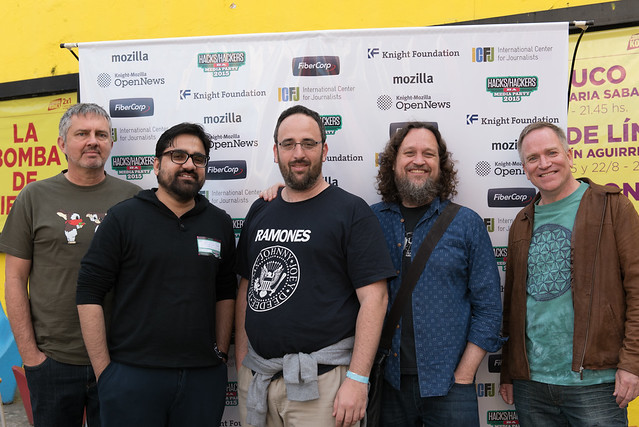
As part of the Knight International Media Innovators blog, the ICFJ Knight team will round up stories focused on how their fellows are making an impact in the field. Find out more about the fellows' projects by clicking here.
Investigative reporters meet in New Orleans this month, the next Media Party planned for Buenos Aires and more from the Knight Fellows in this week’s roundup.
Networking at IRE for cross-border investigative journalism
ICFJ Knight Fellows and their projects will feature prominently at the 2016 Investigative Reporters and Editors Conference June 16-19 in New Orleans. ICFJ Knight Fellow Jorge Luis Sierra will explain how to bulletproof newsroom security, including the latest ways journalists can protect themselves from cyber attacks, espionage and eavesdropping. Amanda Strydom, managing editor of the African Network of Centers for Investigative Reporting (ANCIR), and Code for Africa lead technologist David Lemayian will speak about international networking and working with African newsrooms on investigative reporting projects. ICFJ also will host a “Steal My Tool” event, where Fellows will showcase the latest open source investigative data journalism tools and projects that participants can bring back to their newsrooms to use.
Save the date for Media Party
Hacks/Hackers Buenos Aires (HHBA) announced it will host its fifth annual Media Party on August 25-27. The event brings together more than 1,600 journalists, entrepreneurs, developers and designers from five continents, making it the largest gathering of its kind in Latin America, according to a blog post by former ICFJ Knight Fellow Mariano Blejman. This year’s theme is “Rebooting Journalism.” HHBA has more than 5,200 members, making it the largest Hacks/Hackers chapter in the world. Blejman started the HHBA chapter in 2011 and established Media Party in 2012.
Check out these photos for a recap of Media Party 2015:
How tax havens affect funding for public health
Award-winning investigative reporter Khadija Sharife writes that offshore tax havens, such as those exposed by the Panama Papers, deprive governments of revenues that can be used to improve public health. “Any loss of tax revenues has a direct impact on access to medicines because countries have less revenue to purchase and supply medicines,” writes Sharife in a Health and Human Rights Journal blog post. Sharife is editor at ANCIR, which was founded by ICFJ Knight Fellow Justin Arenstein. A partner in the global Panama Papers project, ANCIR has reported on pharmaceutical companies’ use of offshore accounts, alleging the practice allows the companies to avoid billions in taxes.
Why collaboration is key in investigative journalism
From collaborations across countries to choosing the best tools for data analysis, it is a complex process to coordinate newsrooms for investigative reporting projects, like the Panama Papers. In a recent Dow Jones webinar, ICFJ Knight Fellow Chris Roper, International Consortium of Investigative Journalists reporter Will Fitzgibbon, ANCIR managing editor Amanda Strydom and ANCIR editor Khadija Sharife discussed how they worked with a network of international newsroom partners to report on Africans named in the leaked documents.
“The future of massive data journalism stories now is going to have to be collaboration,” Roper said during the webinar. “One [reason] is that you need a lot more people to look at [11.5 million] documents. You can’t afford the time or the resources to do that as just a single title, or even a handful of titles, as it was with the Snowden leaks. And the other reason is that stories are not about a single place anymore, stories are global.”
South African government to investigate 1,700 South Africans named in the Panama Papers
In the wake of the Panama Papers investigation, the South African Revenue Service announced the creation of a special unit to check tax compliance records for the 1,700 South Africans named in the leaked materials. ANCIR produced Panama Papers stories for the Mail & Guardian as well as other South African publications and provided training and some support to local media partner amaBhungane, which also published stories about the leak.
What happens when “tech geeks meet journalism”
ICFJ Knight Fellow Catherine Gicheru gave the keynote address at the Canadian Association of Journalists conference last week in Edmonton, Canada. Gicheru spoke on her role in bringing together journalists and technologists to produce data-driven stories and develop new digital tools that can be used to strengthen storytelling and increase civic engagement. For example, GotToVote simplifies the process of finding voter registration centers. Since it was launched in Kenya, the tool has been used by hundreds of thousands of citizens in five additional countries, two of which adopted it as an “official” registration tool.
Saturday keynote: @TaylorVaisey introduces @cgicheru1, an award-winning journalist based in Kenya. #caj2016 pic.twitter.com/gUlVkcdF3E
— Susana Mas (@susanamas) May 28, 2016
This post was also published on IJNet, which is produced by ICFJ.
Main image CC-licensed by Flickr via Sarah Altendorf.
